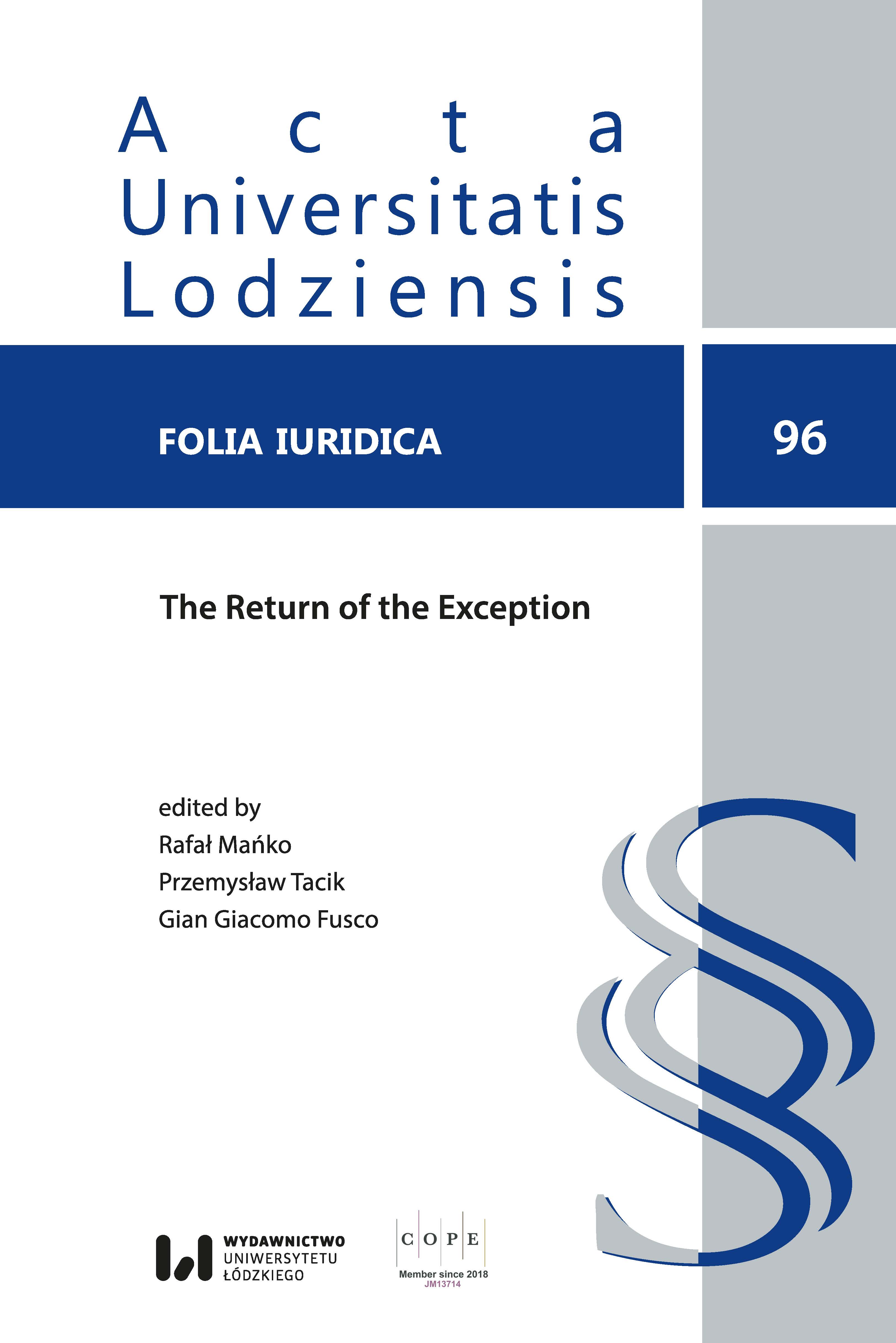Notes on Bio-History: Michel Foucault and the Political Economy of Health
DOI:
https://doi.org/10.18778/0208-6069.96.09Keywords:
bio-history, social medicine, Michel Foucault, public health, institutions, COVID-19 pandemicsAbstract
In October 1974, Foucault gave three lectures in Rio de Janeiro on the archeology of the cure. This piece will comment on the first two, published a few years later in France with the original titles: Crise de la médicine ou crise de l’antimédicine? and La naissance de la médicine sociale. Bio-history is the term Michel Foucault initially uses – in the second lecture – to refer to the effect of the strong medical intervention at the biological level that started in the eighteenth century and has left a trace that is still visible in our society. It is on this occasion that Foucault introduces the concept, or rather the prefix “bio-” in his analysis, and it is here – as my reflections intend to demonstrate – that we may trace the original meaning of a term that today seems rather abused and find a valuable analytical framework for a cogent approach to the relationship between medicine and power dynamics.
Downloads
References
Agamben, Giorgio. 2020. “Medicine as religion.” Itself/An und für sich, May 2, 2020. Translated by Adam Kotsko. https://itself.blog/2020/05/02/giorgio-agamben-medicine-as-religion/
Google Scholar
Beveridge, William. 1942. Report: Social Insurance and Allied Services. London: HMSO.
Google Scholar
Bourdieu, Pierre. Jean-Claude Chamboredon. Jean-Claude Passeron. 1991. The Craft of Sociology. Preliminary Remarks. Berlin–New York: Walter de Gruyter. https://doi.org/10.1515/9783110856460
Google Scholar
DOI: https://doi.org/10.1515/9783110856460
Canguilhem, Georges. 1991. The Normal and the Pathological. New York: Zone Books.
Google Scholar
Claverie, Jean-Michel. Hiroyuki Ogata. 2009. “Ten good reasons not to exclude viruses from the evolutionary picture.” Nature Reviews Microbiology 7: 615. https://doi.org/10.1038/nrmicro2108-c3
Google Scholar
DOI: https://doi.org/10.1038/nrmicro2108-c3
Engels, Friedrich. 1973. The Condition of the Working Class in England in 1844. Moscow: Progress Publishers.
Google Scholar
Foucault, Michel. 1976. The Birth of the Clinic: An Archaeology of Medical Perception. Abingdon: Routledge.
Google Scholar
Foucault, Michel. 1977. Discipline and Punish: The Birth of the Prison. New York: Random House.
Google Scholar
Foucault, Michel. 1978. The History of Sexuality. Vol. I. An Introduction. New York: Pantheon.
Google Scholar
Foucault, Michel. 1990. “Social Security.” In Politics, philosophy, culture. Interviews and other writings: 1977–1984. Abingdon: Routledge.
Google Scholar
Foucault, Michel. 1991. “Introduction.” In The Normal and the Pathological. Edited by Georges Canguilhem. New York: Zone Books.
Google Scholar
Foucault, Michel. 2001a. “The Birth of Social Medicine.” In Power: The Essential Works of Foucault. 1954–1984. Vol. 3. 134–156. Edited by James Faubion. Chicago: New Press.
Google Scholar
Foucault, Michel. 2001b. “The Politics of Health in Eighteen Century.” Translated by Colin Gordon. In Power: The Essential Works of Foucault. 1954–1984. Vol. 3. 90–105. Edited by James Faubion. Chicago: New Press.
Google Scholar
Foucault, Michel. 2001c. “L’extension sociale de la norme.” In Dits et écrits. 1954–1988. Vol. II. 74–79. Paris: Gallimard.
Google Scholar
Foucault, Michel. 2001d. “Les grandes fonctions de la medicine sociale dans notre société.” In Dits et Écrits. 1954–1988. Vol. I. 110. [1248–1250]. Paris: Gallimard.
Google Scholar
Foucault, Michel. 2003. “Society Must Be Defended.” Lectures at the Collège de France: 1975–1976. Paris: Picador.
Google Scholar
Foucault, Michel. 2004. “The Crisis of Medicine or the Crisis of Antimedicine?” Foucault Studies 1: 5–19. https://doi.org/10.22439/fs.v0i1.562
Google Scholar
DOI: https://doi.org/10.22439/fs.v0i1.562
Foucault, Michel. 2014. “The Politics of Health in Eighteenth Century.” Translated by Richard A. Lynch. Foucault Studies 18: 113–127. https://doi.org/10.22439/fs.v0i18.4654
Google Scholar
DOI: https://doi.org/10.22439/fs.v0i18.4654
Haraway, Donna. 1992. The Promises of Monsters: A Regenerative Politics for Inappropriate/d Others. New York: Routledge.
Google Scholar
Harris, Hugh. M.B. Colin Hill. 2021. “A Place for Viruses on the Tree of Life.” Frontiers in Microbiology 11: 1–16. https://doi.org/10.3389/fmicb.2020.604048
Google Scholar
DOI: https://doi.org/10.3389/fmicb.2020.604048
Hart, Julian T. 1971. “Inverse Care Law.” Lancet 297: 405–412. https://doi.org/10.1016/S0140-6736(71)92410-X
Google Scholar
DOI: https://doi.org/10.1016/S0140-6736(71)92410-X
Hills, John et al. Eds. 1994. Beveridge and Social Security: An International Retrospective. Oxford: Clarendon Press.
Google Scholar
Latour, Bruno. 2020. “What protective measures can you think of so we don’t go back to the pre-crisis production model?” Bruno Latour, March 30, 2020. http://www.bruno-latour.fr/sites/default/files/downloads/P-202-AOC-ENGLISH_1.pdf
Google Scholar
Moreira, David. Purificación López-García. 2009. “Ten reasons to exclude viruses from the tree of life.” Nature reviews Microbiology 7: 306–311. https://doi.org/10.1038/nrmicro2108
Google Scholar
DOI: https://doi.org/10.1038/nrmicro2108
Napoli, Paolo. 2003. Naissance de la police moderne. Pouvoir, normes, société. Paris: La Découverte. https://doi.org/10.3917/dec.napol.2003.01
Google Scholar
DOI: https://doi.org/10.3917/dec.napol.2003.01
Napoli, Paolo. 2009. “Misura di polizia: un approccio storico-concettuale in età moderna.” Quaderni Storici 44: 523–547.
Google Scholar
Pandolfi, Alessandro. 2006. “La ‘natura’ della popolazione.” In Governare la vita. Un seminario sui Corsi di Michel Foucault al Collège de France (1977–1979). Edited by Sandro Chignola. Ombre Corte: Verona.
Google Scholar
Rose, Nikolas. 2007. The Politics of Life Itself. Biomedicine, Power, and Subjectivity in the Twenty-First Century. Princeton: Princeton University Press. https://doi.org/10.1515/9781400827503
Google Scholar
DOI: https://doi.org/10.1515/9781400827503
Stengers, Isabelle. 2015. In catastrophic times: resisting the coming barbarism. New Jersey: Open Humanity Press.
Google Scholar
Szreter, Simon. Graham Mooney. 1998. “Urbanization, mortality, and the standard of living debate: new estimates of life at birth in nineteenth century British cities.” Economic History Review 51: 84–112. https://doi.org/10.1111/1468-0289.00084
Google Scholar
DOI: https://doi.org/10.1111/1468-0289.00084
Virchow, Rudolf. 1957. Werk und Wirkung. Berlin: Rutten & Loenig.
Google Scholar
Virchow, Rudolf. 1958. Disease, Life, and Man. Stanford CT: Stanford University Press.
Google Scholar
Waitzkin, Howard. 2006. “One and a half centuries of forgetting and rediscovering: Virchow’s lasting contributions to Social Medicine.” Social Medicine 1: 5–10.
Google Scholar
Waitzkin, Howard. 2011. Medicine and Public Health at the End of Empire. Abingdon: Routledge.
Google Scholar
Waitzkin, Howard, 2018. Health Care Under the Knife: Moving Beyond Capitalism for Our Health. New York: NYU Press.
Google Scholar
Weber, Max. 1949. The Methodology of the Social Sciences. Illinois: The Free Press of Glencoe.
Google Scholar
The Poor Law Amendment Act: 14 August 1834.
Google Scholar
The United Nations. 1948. Article 25. Universal Declaration of Human Rights. Paris. https://www.un.org/en/about-us/universal-declaration-of-human-rights
Google Scholar
World Health Organization. 1948. Constitution. Geneva. https://www.who.int/governance/eb/who_constitution_en.pdf
Google Scholar
Downloads
Published
How to Cite
Issue
Section
License

This work is licensed under a Creative Commons Attribution-NonCommercial-NoDerivatives 4.0 International License.














